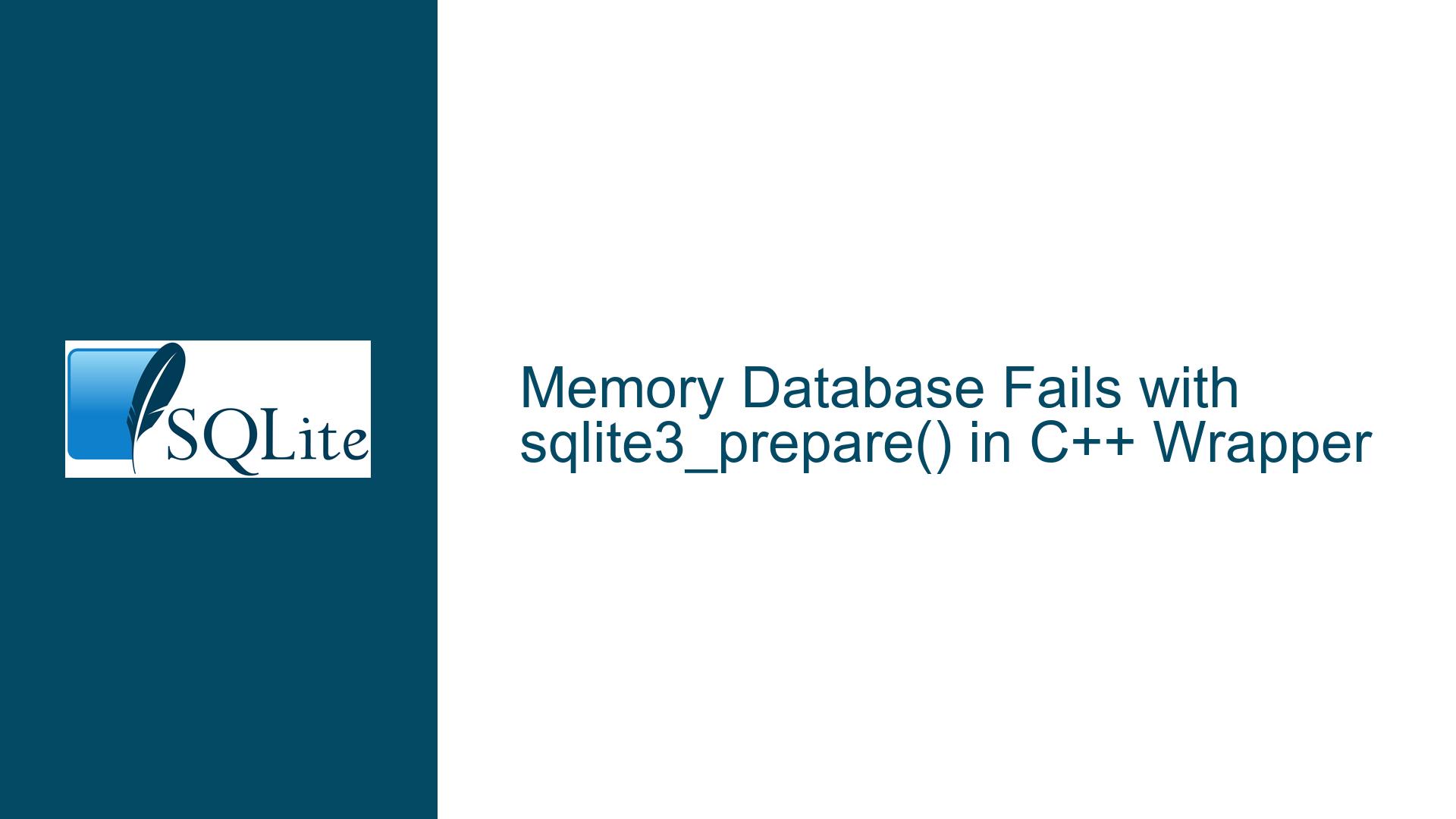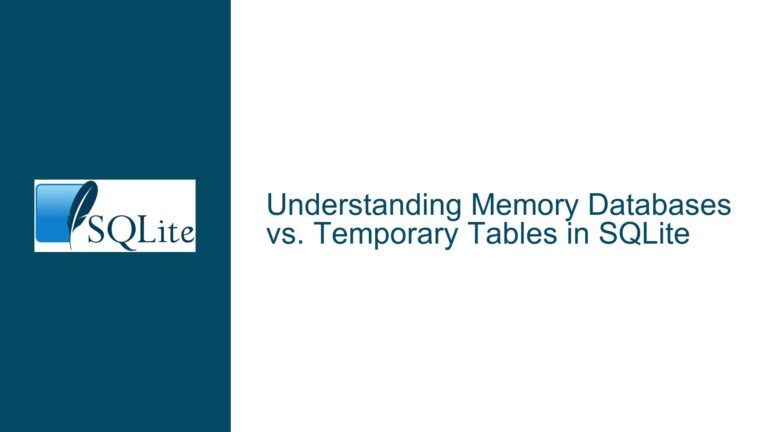Memory Database Fails with sqlite3_prepare() in C++ Wrapper
Memory Database Initialization and sqlite3_prepare() Failure
The core issue revolves around the failure of the sqlite3_prepare() function when using an in-memory SQLite database, while the same code works flawlessly with a file-based database. The error manifests as a CppSQLite3Exception being thrown, indicating a problem during the preparation of the SQL statement. This issue is particularly perplexing because the codebase remains unchanged except for the database type, suggesting that the problem lies in the interaction between the memory database and the C++ wrapper being used.
The code snippet provided shows a typical workflow where a connection to the database is established, a statement is compiled using compileStatement(), and then executed. The compileStatement() method internally calls sqlite3_prepare(), which is where the exception is thrown. The error occurs specifically when the database is set to :memory:, while the file-based database (/tmp/NetData) works without issues. This discrepancy points to a nuanced interaction between the memory database and the C++ wrapper, which may not be handling the memory database’s unique characteristics correctly.
Potential Causes of Memory Database Failure
One of the primary causes of this issue could be the improper initialization of the memory database. Unlike file-based databases, memory databases are ephemeral and exist only for the duration of the connection. If the connection is not properly established or if the database schema is not correctly set up, sqlite3_prepare() may fail. Another potential cause is the C++ wrapper’s handling of memory databases. Wrappers like CppSQLite3 often abstract away low-level details, but they may not fully account for the differences between memory and file-based databases. For instance, the wrapper might assume that certain operations, such as schema creation or table initialization, are already handled by the time sqlite3_prepare() is called, which may not be the case with a memory database.
Additionally, the error could stem from the way the memory database handles transactions. Memory databases do not persist data across sessions, and if the wrapper attempts to perform operations that assume persistence, such as caching or reusing prepared statements, it could lead to errors. The CppSQLite3Exception being thrown suggests that the wrapper is encountering an unexpected state or condition when dealing with the memory database, which it does not handle gracefully.
Detailed Troubleshooting and Solutions
To troubleshoot this issue, start by verifying the initialization of the memory database. Ensure that the connection to the memory database is correctly established and that the schema is properly set up before any operations are performed. This can be done by explicitly creating tables and initializing the schema within the same connection scope. If the schema is not initialized, sqlite3_prepare() will fail because it cannot find the necessary tables or structures to prepare the statement against.
Next, examine the C++ wrapper’s implementation to ensure it correctly handles memory databases. Review the wrapper’s source code, particularly the parts that interact with sqlite3_prepare() and other low-level SQLite functions. Look for any assumptions the wrapper might be making about the database type, such as expecting a file-based database or assuming that certain operations are already performed. If such assumptions are found, modify the wrapper to account for memory databases explicitly.
Another step is to isolate the issue by creating a minimal reproducible example. Strip down the code to the bare essentials, removing any extraneous logic or dependencies, and focus solely on the interaction between the memory database and the sqlite3_prepare() function. This will help identify whether the issue lies within the wrapper, the database initialization, or some other part of the code.
If the issue persists, consider using a different C++ wrapper or directly interfacing with the SQLite C API. While wrappers provide convenience, they can sometimes introduce issues, especially when dealing with less common use cases like memory databases. By using the raw SQLite C API, you can eliminate the wrapper as a potential source of the problem and gain more control over the database operations.
Finally, ensure that the memory database is being used correctly within the context of your application. Memory databases are ideal for temporary data storage and testing, but they may not be suitable for all use cases. If the application requires persistence or complex transactions, consider using a file-based database instead. If a memory database is necessary, make sure that all operations are performed within the same connection scope and that the database is properly initialized before any queries are executed.
By following these steps, you should be able to identify and resolve the issue with sqlite3_prepare() failing when using a memory database. The key is to carefully examine the initialization process, the wrapper’s handling of memory databases, and the overall context in which the memory database is being used. With a thorough approach, you can ensure that your application works seamlessly with both memory and file-based databases.






